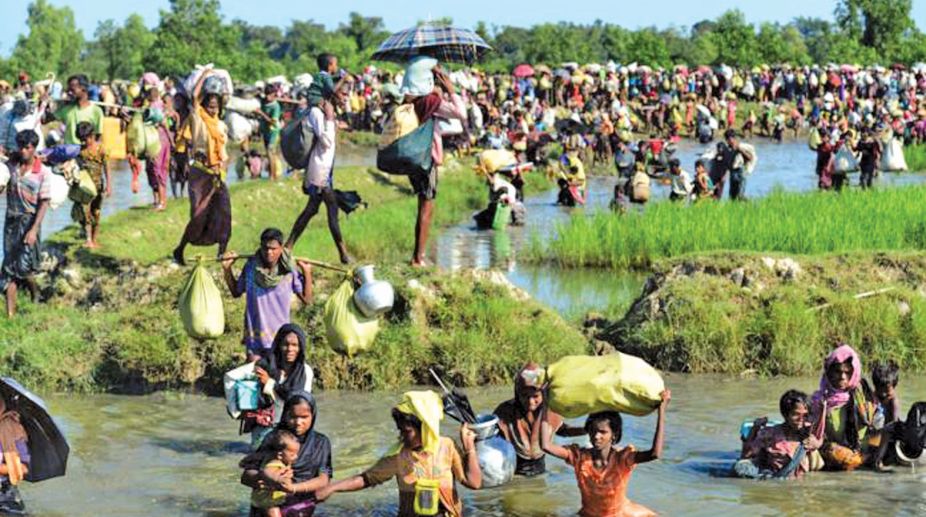The Rohingya issue has begun taking a political turn with leaders cutting across party lines projecting their views that are in many ways contrary to that of the government and against the national interest. Omar Abdullah stated that there were no reports of Rohingya being a security threat till 2014, when he was the Chief Minister.
Mamta Banerjee, through whose state most Rohingya transit, stated that some may be security risks, not all. Muslim leaders are threatening violence in Bengal, if deportation takes place. The Congress has demanded that the opposition be taken into confidence, before the government finalises its decisions. It even went on to state that India should accept illegal immigrants, especially if they come from a troubled region.
Advertisement
It is surprising that those political parties which accepted illegals throughout their time in power only to garner votes, continue with the same policy with similar intentions. The Congress paid no heed when millions of Bangladeshis illegally migrated to Assam, changing its demography.
General S K Sinha (retired), then Governor of Assam, even wrote to the President in November 1998, “Large scale illegal migration from East Pakistan/Bangladesh over several decades has been altering the demographic complexion of this state. It poses a grave threat both to the identity of the Assamese people and to our national security.” There was no reaction from the Centre.
The Congress formulated the Illegal Migrants (Determination by Tribunal) (IMDT) act in 1983, which was skewed in favour of illegal migrants. It was the Supreme Court which finally struck the act down in 2005. However, the act gave birth to a horde of militant groups in Assam, seeking removal of illegals. It never bothered the Congress when thousands died during militancy, which continues to dog the state.
In Bengal, all border districts pose major law and order issues, solely because of a skewed demography created by massive influx of Bangladeshi illegal migrants. There are regular reports of anti-national activities including bomb and weapon manufacturing units.
Since they support the ruling party, there is no action being taken to declare them as illegal migrants. Reports of violence which are a regular feature in this region are suppressed and on such occasions visits by the media and other political parties are banned.
Omar Abdullah never objected when the Rohingya came and settled around Jammu. He has never once stated that they would change the demography of the region and hence should be moved to the valley. The fact that the demography is rapidly changing around Jammu and the Rohingyas remain a security threat has no relevance to him, because if they stay his vote bank increases.
If he was to even suggest their move to the valley, he would never be accepted there. This is a clear case of religion-supported vote bank politics.
The government rightly stated in the Supreme Court, “India is already saddled with a very serious problem of illegal migrants.”
It added that it is attempting to address this problem keeping national resources of the country, requirements of our own population and national security in mind. Reports of involvement of the ISI and LeT in training the Rohingya militancy and seeking to lure illegal Rohingya migrants into their fold are making news. Pakistani agents have been arrested while on these missions. The question we need to ask our politicians is whether votes and winning elections are more important than national security.
India cannot afford to accept illegal migrants, when its own nationals are unable to gain the benefits of its development and resources. While India grows economically, the benefits should belong to the Indian citizen, not illegal migrants.
This is an era of realpolitik; no longer can India remain a nation of pacifists, accepting all and sundry who find entry into the country by illegal means. We need to consider our own nationals first, irrespective of religion, caste or creed, before considering illegal migrants.
The world over nations refuse entry to illegals. Europe has turned away most migrants from the war-torn zones of Iraq, Syria and Afghanistan. Border fencing has for the first time been visible within the EU.
Nations have refused the EU diktat to accept illegal migrants. Europe has begun deporting many back to their homelands, still locked in conflict; after all its own population matters more. Terror strikes in Europe are often the handiwork of illegal migrants.
Australia has set up detention camps on Manus islands of Papua New Guinea, clear that none would enter. Not a single Muslim nation, including Saudi Arabia, Pakistan and Iran, are willing to accept any Rohingya migrant. Why should we? We are not the providers of home to all who face persecution.
It is surprising that most lawyers representing the Rohingya against deportation are those from the opposition, seeking to challenge government directions. Is this the India that we are looking at, home to all who seek shelter, denying our own the facilities and services which remain in short supply? Should vote banks and countering every government decision be the sole job of the opposition? Why cannot national political parties follow the concept of ‘nation first’?
Internationally India cannot be criticised for its decision. It is neither a signatory to the 1951 Refugee convention nor its 1967 protocol. It has also not ratified the UN convention against torture, though it signed it in 1997.
It is only our own who seek to let our nationals down. They did it in Assam and Bengal and are willing to do it in other parts of the country. National security has no meaning before political ambitions.
It is time the influential educated masses of the nation opened their eyes and insisted that political parties look at the nation first. This is not the responsibility of the government alone, but of all concerned citizens. Let responsibility for the nation and its citizens, reign above politics and religion, for once.
The writer is a retired Major-General of the Indian Army











